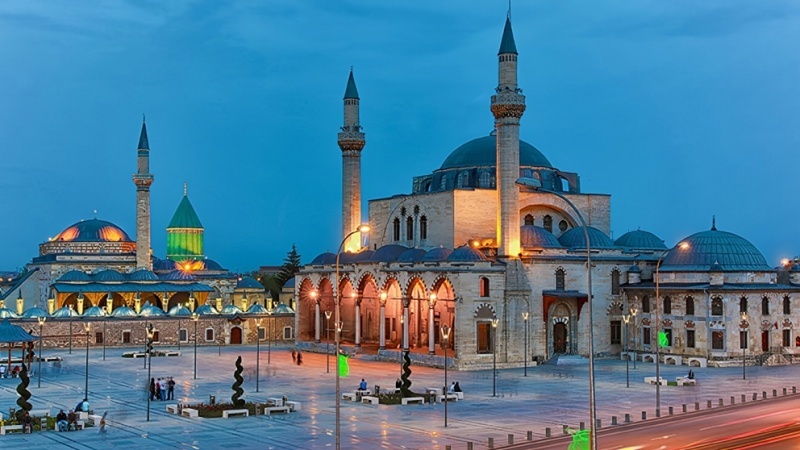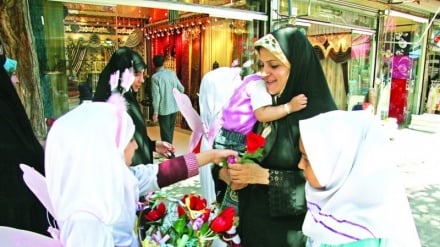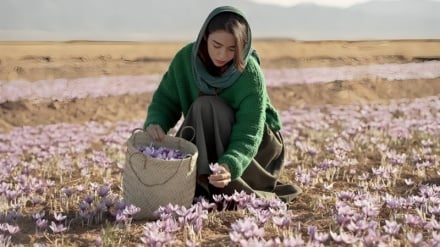What do you know about prominent Iranian poet Rumi?
-

The Tomb of Rumi, the eminent Iranian poet, in Konya
Pars Today – Rumi, the renowned Iranian poet, is known for his poetry and teachings that have influenced not only Persian-speaking countries but also the entire world.
In the history of Iranian culture and literature, few figures have been able to transcend geographical, linguistic, and religious boundaries to become a global symbol of love, meaning, and mysticism like Jalal al-Din Muhammad Balkhi, known as Rumi. In Iran's calendar, September 30, is designated as Rumi Commemoration Day. On this occasion, this report from Pars Today takes a look at the biography of this Iranian poet.
Birth
He was born in 1207 CE (604 AH) in the city of Balkh (in present-day Afghanistan), within the eastern territories of the Persian Empire. Rumi was raised in a family of scholars and theologians. His father, Bahauddin Walad, was a prominent theologian and jurist who, threatened by the Mongols, left Balkh and embarked on a long journey with his family. This journey began in Nishapur, Iran, passed through Mecca, and ultimately reached Karaman in Asia Minor. In 1228 CE (625 AH), at the invitation of the Seljuk ruler, they migrated to Konya (in present-day Turkey), a city that would later become the center of Rumi's life and work.
Education, teaching, and entry into mysticism
Following his father's death, Rumi assumed leadership of his father's school and simultaneously began his formal studies of Islamic mysticism (Irfan). This nine-year period laid the groundwork for a profound spiritual transformation in his character and introduced him to the elevated concepts of Islamic mysticism. Subsequently, Rumi became recognized in Konya as a jurist and scholar. Alongside his teaching, he also played an effective role in resolving the social issues of the people.
Meeting Shams-e Tabrizi
In 1244 CE (642 AH), Rumi met Shams-e Tabrizi on the streets of Konya. This encounter transformed Rumi's life. With his novel perspective on existence, Shams drew Rumi out of rigid religious frameworks and introduced him to the world of divine love and mysticism. This profound influence caused a remarkable transformation in Rumi's poetry, where love emerged as the central force and theme of life in many of his works, such as the Masnavi. In one of his famous poems, Rumi describes love thus:
"Last night, I went mad; Love saw me and said,
'I have come. Do not cry out, do not tear your garment, say nothing.'
I said, 'O Love, I fear something else.'
[Love] said, There is nothing else anymore; Say nothing more.'"
Shams-e Tabrizi lived in Konya for a long time, leaving a profound impact on Rumi, but ultimately departed from the city. This event, one of the darkest points in Rumi's life, led him to search for Shams on various journeys. However, according to many scholars, Shams was never found again.
Passing
Rumi fell ill in 1273 CE (672 AH) and passed away on December 17, 1273. His funeral was held in Konya and attended by a vast multitude of people from different religions and nationalities. He was laid to rest beside his father, and a magnificent mausoleum was later erected over his grave.
Enduring works
Among Rumi's most important works is the "Masnavi-e Ma'navi" (Spiritual Couplets), recognized as one of the greatest and most valuable mystical works in the world. This poetic collection, spanning six volumes and containing approximately twenty-seven thousand couplets, explores themes such as love, spirituality, and the wisdom of life. One of its famous opening verses, which begins with "Listen to the reed as it tells its tale...", has been profoundly admired by numerous poets and mystics. Rumi's other major works include the "Divan-e Shams-e Tabrizi," "Rubaiyat," and "Fihi Ma Fih."


